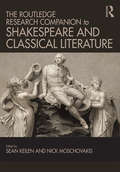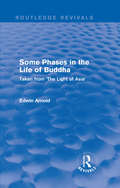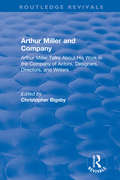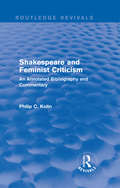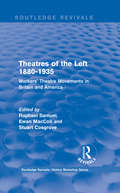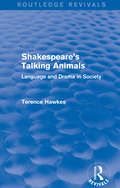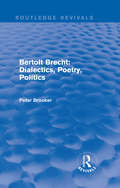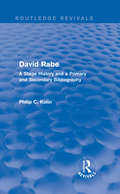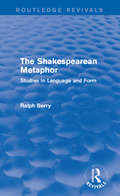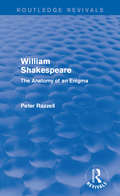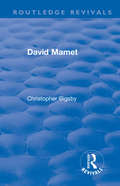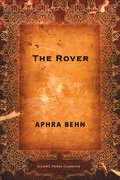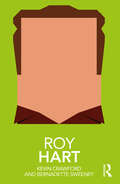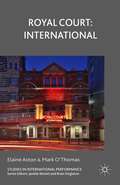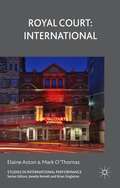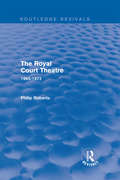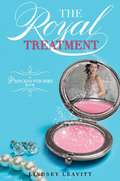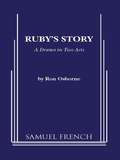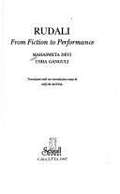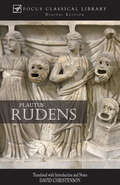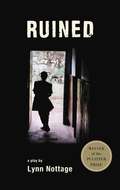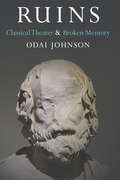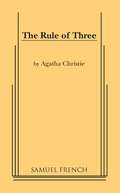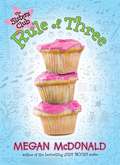- Table View
- List View
The Routledge Research Companion to Shakespeare and Classical Literature
by Nick Moschovakis Sean KeilenIn this wide-ranging and ambitiously conceived Research Companion, contributors explore Shakespeare’s relationship to the classic in two broad senses. The essays analyze Shakespeare’s specific debts to classical works and weigh his classicism’s likeness and unlikeness to that of others in his time; they also evaluate the effects of that classical influence to assess the extent to which it is connected with whatever qualities still make Shakespeare, himself, a classic (arguably the classic) of modern world literature and drama. The first sense of the classic which the volume addresses is the classical culture of Latin and Greek reading, translation, and imitation. Education in the canon of pagan classics bound Shakespeare together with other writers in what was the dominant tradition of English and European poetry and drama, up through the nineteenth and even well into the twentieth century. Second—and no less central—is the idea of classics as such, that of books whose perceived value, exceeding that of most in their era, justifies their protection against historical and cultural change. The volume’s organizing insight is that as Shakespeare was made a classic in this second, antiquarian sense, his work’s reception has more and more come to resemble that of classics in the first sense—of ancient texts subject to labored critical study by masses of professional interpreters who are needed to mediate their meaning, simply because of the texts’ growing remoteness from ordinary life, language, and consciousness. The volume presents overviews and argumentative essays about the presence of Latin and Greek literature in Shakespeare’s writing. They coexist in the volume with thought pieces on the uses of the classical as a historical and pedagogical category, and with practical essays on the place of ancient classics in today’s Shakespearean classrooms.
Routledge Revivals: Taken from 'The Light of Asia' (Routledge Revivals)
by Edwin ArnoldFirst published in 1915, this book presents a dramatization of part ofthe author's The Light of Asia. The original text represents one of the first successful attempts to popularise Buddhism and its founder Gautama Buddha — presenting his life, teachings and philosophy in verse poetry. This adaptation dramatizes part of the The Light of Asia and includes staging instructions, properties required, illustrative drawings of suggested costumes, and incidental music composed specifically for the piece. This book will be of interest to students of Indian and Buddhist literature — and how this has interacted with the West — as well as students of drama.
Routledge Revivals: Arthur Miller Talks About His Work in the Company of Actors, Designers, Directors, and Writers (Routledge Revivals)
by C.W.E. BigsbyFirst published in 1990, this book presents a discussion with Arthur Miller, in conversation with Christopher Bigsby. Miller talks openly and extensively about his own life and experiences, events and environments which provide material for his plays: his New York childhood, the Depression, the McCarthy witch-hunts. He discusses in depth both the technique of his writing and the moral and political questions which his plays address, and argues passionately for the importance of maintaining respect for human values in a world where they are so frequently transgressed. Interwoven with these conversations are contributions from actors, directors, designers, reviewers, and writers who have encountered Miller over the years – whether in person or through his plays – which attest to the universal and enduring importance of his work.
Routledge Revivals: An Annotated Bibliography and Commentary (Routledge Revivals)
by Philip C KolinFirst published in 1991, this book is the first annotated bibliography of feminist Shakespeare criticism from 1975 to 1988 — a period that saw a remarkable amount of ground-breaking work. While the primary focus is on feminist studies of Shakespeare, it also includes wide-ranging works on language, desire, role-playing, theatre conventions, marriage, and Elizabethan and Jacobean culture — shedding light on Shakespeare’s views on and representation of women, sex and gender. Accompanying the 439 entries are extensive, informative annotations that strive to maintain the original author’s perspective, supplying a careful and thorough account of the main points of an article.
Routledge Revivals: Workers' Theatre Movements in Britain and America (Routledge Revivals: History Workshop Series #5)
by Raphael Samuel Ewan Maccoll Stuart CosgroveFirst published in 1985, this book examines how workers theatre movements intended their performances to be activist — perceiving art as a weapon of struggle and enlightenment — and an emancipatory act. An introductory study relates left-wing theatre groupings to the cultural narratives of contemporary British socialism. The progress of the Workers’ Theatre Movement (1928-1935) is traced from simple realism to the most brilliant phase of its Russian and German development alongside which the parallel movements in the United States are also examined. A number of crucial texts are reprints as well as stage notes and glimpses of the dramaturgical controversies which accompanied them.
Routledge Revivals (1973): Language and Drama in Society
by Terence HawkesFirst published in 1973, this book is about Shakespeare, language and drama. The first part introduces some common ideas of anthropology and linguistics into an area where they serve as a base for the discussion of usually literary matters. It attempts to link language to our experience of speech — examining its range, texture, and social functions. In part two, the author argues that in Elizabethan culture there was a greater investment in the complexities and demands of speech due to the widespread illiteracy of the time. It examines eight of Shakespeare’s plays, together with one of Ben Jonson’s, in light of their concern with various aspects of the role of spoken language in society.
Routledge Revivals (1988): Dialectics, Poetry, Politics
by Peter BrookerFirst published in 1988, this books argues with received accounts to reclaim Brecht’s emphasis on his self-described ‘dialectical theatre’, re-examining firstly the concepts of Gestus and Verfremdung and their realisation in Brecht’s poetry in terms of his attempt to consciously apply the methods of dialectical materialism to art and cultural practice. The author also takes issue with the customary view of Brecht’s career and politics which sees him as compromising either with Communist party dogma or bourgeois aesthetics, to find developing parallels between Brecht’s political and artistic though and the critical dialectics of Marx, Lenin and Mao. This development is examined in later chapters in relation to the early and late plays, The Measures Taken and Days of the Commune as well as in relation to Brecht’s changed circumstances in the years of war-time exile and in post-war East Germany.
Routledge Revivals (1988): A Stage History and a Primary and Secondary Bibliography
by Philip C. KolinIn the twenty years that preceded the publication of this book in 1988, David Rabe was in the vanguard of playwrights who shaped American theatre. As the first full-length work on Rabe, this book laid the groundwork for later critical and biographical studies. The first part consists of an essay that covers three sections: a short biography, a summary and evaluation of his formative journalism for the New Haven Register, and a detailed and cohesive stage history of his work. The second part presents the most comprehensive and authoritative primary bibliography of Rabe to date, with the third section containing a secondary bibliography — including a section on biographical studies.
Routledge Revivals (1990): Studies in Language and Form
by Ralph BerryFirst published in 1978, this book represents a study of the ways in which Shakespeare exploits the possibilities of metaphor. In a series of studies ranging from the early to the mature Shakespeare, the author concentrates on metaphor as a controlling structure — the extent to which a certain metaphoric idea informs and organises the drama. These studies turn constantly to the relations between symbol and metaphor, literal and figurative, and examine key plays such as Richard III, King John, Henry V, Romeo and Juliet, Troilus and Cressida, and Coriolanus. They also provide a key to The Tempest which is analysed in terms of power and possession — the dominant motif.
Routledge Revivals (1990): The Anatomy of an Enigma
by P. E. RazzellFirst published in 1990, the aim of this book is to reveal the William Shakespeare whose life has been obscured by centuries of literary mythology. It unravels a series of strands in order to understand the man and the major influences which shaped his life and writing. The first part advances the thesis that his relationship with his father directly influenced the character of Falstaff — helping to not only explain key events in his father’s life but also critical events in his own biography. This thesis not only illuminates the Falstaff plays but also a number of other works such as Hamlet. The second part focuses on Shakespeare’s own life, and includes much original research particularly on the tradition that he was a poacher of deer, discussing the influence this incident had on his later life and writings. In addition, a sociological approach has been used which illuminates a number of key areas, including questioning the view his background was narrow and provincial — which has often been used to dispute his authorship of plays of such cosmopolitan appeal.
Routledge Revivals: David Mamet (Routledge Revivals)
by Christopher BigsbyFirst published in 1985, C.W.E Bigsby examines the career and work of playwright David Mamet. Bigsby shows that Mamet is a fierce social critic, indicting an America corrupted at its core by myths of frontier individualism and competitive capitalism. Mamet has created plays whose bleak social vision and ironic metaphysics are redeemed, if at all, by the power of imagination. No American playwright before him has displayed the same sensitivity to language, detecting lyricism in the brutal incoherencies of every day speech and investing with meaning a contemporary aphasia. Few have offered dramatic metaphors of such startling and disturbing originality. Bigsby’s study is the first book to provide a thorough account of David Mamet’s life and career, as well as close analyses of individual plays.
The Rover or, The Banished Cavaliers
by Aphra BehnThe Rover or The Banish'd Cavaliers (1677) is a play in two parts that is written by the English female author Aphra Behn. It is a revision of Thomas Killigrew's play Thomaso, or The Wanderer (1664), and depicts the amorous adventures of a group of Englishmen in Naples at Carnival time. According to Restoration poet John Dryden, it "lacks the manly vitality of Killigrew's play, but shows greater refinement of expression." The play stood for three centuries as "Behn's most popular and most respected play." The Rover features multiple plot lines, dealing with the amorous adventures of a group of Englishmen in Naples at Carnival time.
Roy Hart (Routledge Performance Practitioners)
by Kevin Crawford Bernadette SweeneyRoy Hart’s revolutionary work on the human voice through extended vocal technique and the Wolfsohn-Hart tradition has influenced several generations of practitioners. Hart’s outstanding contribution to vocal research, practice and performance stretched over 20 years until his untimely death in 1975, and his vocal training produced performers with extraordinary and highly expressive vocal ranges. He founded a theatre company, Roy Hart Theatre, that brought his ideas to realisation in ground-breaking works. His influence, through his own use of the voice for theatre and music and its embodiment in his company, was widespread, attracting the interest of directors such as Peter Brook, Jerzy Grotowski and Jean-Louis Barrault. This book combines: a detailed biography giving the social and artistic context of Hart’s work and that of the early Roy Hart Theatre an exploration of Hart’s own writings on his work, combined with a review of articles by his wife Dorothy Hart and in-depth interviews a stylistic analysis of his key works, including The Bacchae, and, L'Economiste and Biodrame, and their critical reception pathways into some of the practical exercises devised by close collaborators of Roy Hart and practitioners of the Roy Hart Theatre Tradition. As a first step towards critical understanding, and as an initial exploration before going on to further, primary research, Routledge Performance Practitioners offer unbeatable value for today’s student.
Royal Court: International
by Elaine Aston Mark O’thomasRoyal Court: International is the first full-length study of the Royal Court Theatre's International Department. It charts the engagement of the UK's premiere theatre for new writing with an internationalist agenda and takes readers inside the process developed by the Court for the workshop projects it has undertaken in different parts of the world since the late 1990s. Covering the theatre's unique programming of international plays and seasons, it highlights new writing from different parts of the globe, including France, Spain, Germany, Russia, Eastern Europe, Brazil, Cuba, Mexico, Columbia, Iran, the Near East, North Africa, Nigeria and India. First-hand accounts of the work appear in contributions from Stephen Daldry, Elyse Dodgson and Vicky Featherstone, and in interviews with Marcos Barbosa (Brazil), Anupama Chandrasekhar (India), Dominic Cooke, Sasha Dugdale, Marius von Mayenburg (Germany), Mark Ravenhill and Indhu Rubasingham.
Royal Court: International (Studies in International Performance)
by E. Aston Mark O'ThomasThe first ever full-length study of the Royal Court Theatre's International Department, covering the theatre's unique programming of international plays and seasons, its London-based residences for writers from overseas, and the legacies of workshops conducted in more than 30 countries.
Royal Court: International (Studies In International Performance)
by Elaine Aston Mark O’ThomasThe first ever full-length study of the Royal Court Theatre's International Department, covering the theatre's unique programming of international plays and seasons, its London-based residences for writers from overseas, and the legacies of workshops conducted in more than 30 countries.
The Royal Court Theatre: 1965-1972 (Routledge Revivals)
by Philip RobertsThe English Stage Company at the Royal Court Theatre is the longest running specialist production organization in the history of British theatre. Philip Roberts’s account, which was first published in 1986, covers the period 1965-1972 in the Company’s life, beginning in 1965 with the appointment of William Gaskill as Artistic Director. It is not simply about the critical triumphs of these years of the Royal Court’s work, but also about the day-to-day workings of a busy and often turbulent organization. The result of the book is both scholarly and entertaining. This book will be of interest to students of the theatre and drama.
The Royal Treatment (A Princess For Hire Book Series)
by Lindsey LeavittWhat girl wouldn’t swoon over the outrageous perks in Desi's life as a princess substitute? <P><P>Desi gets to hang out with crush-worthy Prince Karl, and the Façade agency has taken a special interest in her magical abilities. <P><P>But between sub training, starting the eighth grade, and dealing with the cute-but-bossy new boy Reed, she’s beginning to feel like she’s in over her head. <P><P>Even worse, when Desi learns a secret about the magic that keeps Façade running, she realizes that not everything is as perfect as it seems. <P><P> Perfect for fans of The Princess Diaries and full of humor and heart, this second installment in the Princess for Hire series shows Desi that the royal treatment may just be masking mysteries, and only she can uncover the truth....one princess at a time!
Ruby's Story
by Ron OsborneDrama / Characters: 3m, 6f / June 1944. In England, Allied troops are massing for an invasion. On a small farm in Appalachia, a different kind of war is about to rage. Here, Walter and Grace share a home with four daughters: Rose, who struggles to understand why Stan - an immigrant coal miner and the love of her life - abruptly left to join the Polish Free Forces; Helga, who fears for her husband who's in the Army and - like Stan - assigned to a combat unit in England; Frieda, the family's adventure-seeking daughter, who works in a factory making uniforms and new friends, one of whom she can't bring home; and teenage Ruby who yearns to be the next Edward R. Murrow, but who must first come to grips with a family falling apart at the seams. D-Day speeds the dissolution process. But at its core is Walter's seeming allegiance to his German heritage, no matter that Helga's husband and Rose's fiancé are at war against all things German. There - through every battle - is Grace, hoping liberal doses of humor, love and understanding can restore harmony. It is adult Ruby - back for a funeral, seeking answers to questions that haunt her - who retells the family's struggle against prejudice, fear, delusion and self-loathing.
Rudali: From Fiction to Performance
by Mahasweta Devi Usha Ganguli Anjum KatyalRudali means 'hired crier'. It is a Bengali short story by Mahasweta Devi. Also in this book is the Hindi play of the same name that is adapted from the short story by Usha Ganguli.
Rudens: The Rope
by David Christenson PlautusThe play Rudens provides an introduction to the world of Roman comedy from one of its best practitioners, Plautus. As with all Focus translations, the emphasis is on an inexpensive, readable edition that is close to the original, with an extensive introduction, notes and appendices.
Ruined
by Lynn NottageWinner of the 2009 Pulitzer Prize for Drama"A powerhouse drama. . . . Lynn Nottage's beautiful, hideous and unpretentiously important play [is] a shattering, intimate journey into faraway news reports."--Linda Winer, Newsday"An intense and gripping new drama . . . the kind of new play we desperately need: well-informed and unafraid of the world's brutalities. Nottage is one of our finest playwrights, a smart, empathetic and daring storyteller who tells a story an audience won't expect."--David Cote, Time Out New YorkA rain forest bar and brothel in the brutally war-torn Congo is the setting for Lynn Nottage's extraordinary new play. The establishment's shrewd matriarch, Mama Nadi, keeps peace between customers from both sides of the civil war, as government soldiers and rebel forces alike choose from her inventory of women, many already "ruined" by rape and torture when they were pressed into prostitution. Inspired by interviews she conducted in Africa with Congo refugees, Nottage has crafted an engrossing and uncommonly human story with humor and song served alongside its postcolonial and feminist politics in the rich theatrical tradition of Bertolt Brecht's Mother Courage.Lynn Nottage's plays include Crumbs from the Table of Joy, Fabulation, and Intimate Apparel, winner of the American Theatre Critics' Steinberg New Play Award and the Francesca Primus Prize. Her plays have been widely produced, with Intimate Apparel receiving more productions than any other play in America during the 2005-2006 season.
Ruins: Classical Theater and Broken Memory (Theater: Theory/Text/Performance)
by Odai JohnsonTheorizing the effects of memory, absence, and disappearance in classical theater—the aesthetics of ruins.
The Rule of Three
by Agatha ChristieMelodrama / 5m, 4f / Unit Set. The Rule of Three is a collection of the three short plays: Afternoon At The Seaside, The Rats, and The Patient. Afternoon at the Seaside: The scene is a seashore resort. Among the characters: a siren in a bikini, ogling men and envious women. The undercurrents are perfect for theft. At the very end the wanton siren emerges as a policewoman who solves the otherwise perfect crime. The Rats: nvited to a party in a London flat, Sandra Grey and David Forrester find themselves alone. Somebody knows about their affair and somebody has locked them in. The Patient: Paralysed and unable to speak after she was pushed from her balcony, Mrs Wingfield must find a way to reveal her would-be murderer before they strike again.
The Rule of Three (The Sisters Club)
by Megan McdonaldThe play's the thing when sibling rivalry takes center stage in a funny, spot-on, all-new Sisters Club story by the inimitable creator of Judy Moody. Alex has always been the Actor-with-a-capital-A in the Reel family, and middle-sister Stevie has always been content behind the scenes. But when the school play turns out to be a musical, Stevie (the natural-born singer of the family), decides that she may just be tired of being the Sensible One. Maybe, for once, she'd like to be the one in the spotlight! Alex isn't so keen on vying for the same role as her younger sister, however, and soon the dueling divas -- with little sister Joey egging them on -- are engaged in a fierce competition to find out who's got what it takes to play the Princess. Has Stevie broken the rules by going for what she wants -- or will it be Alex who hands down the biggest betrayal of all?
